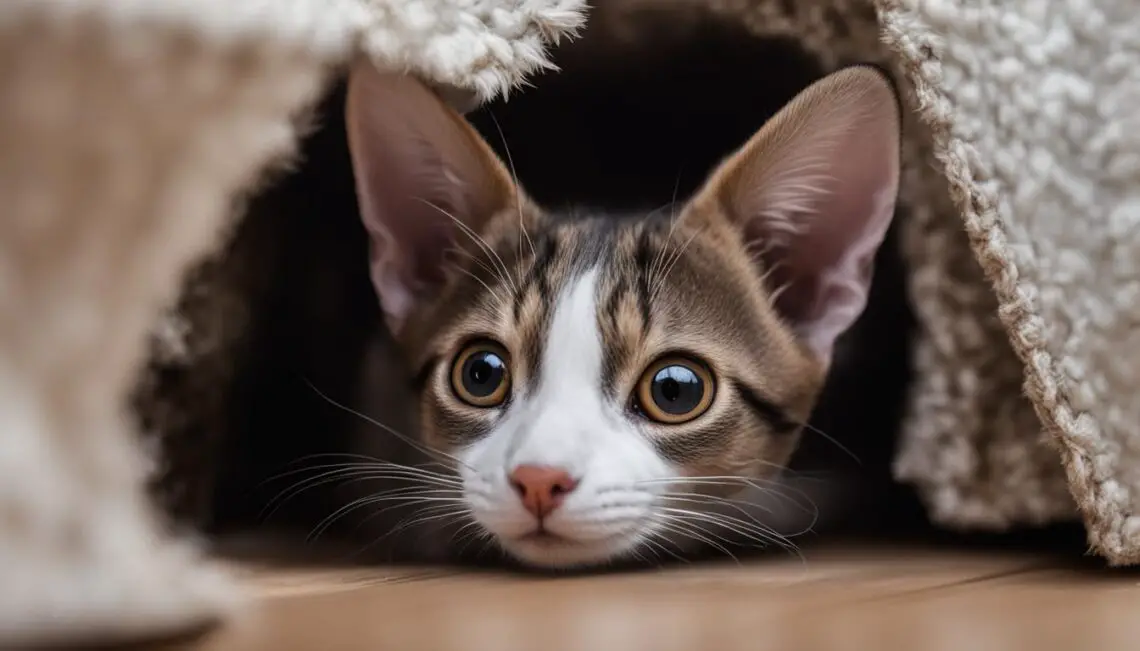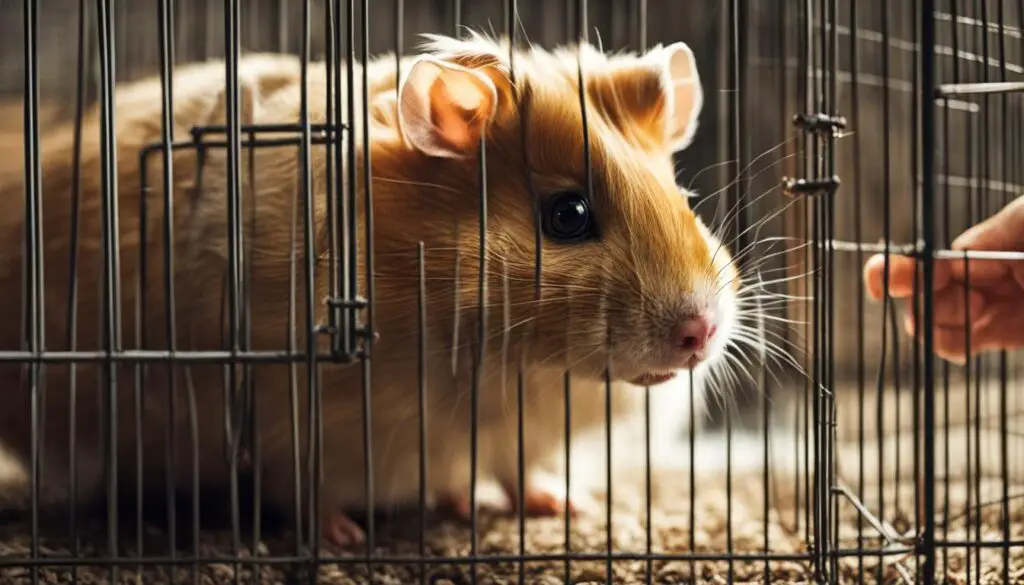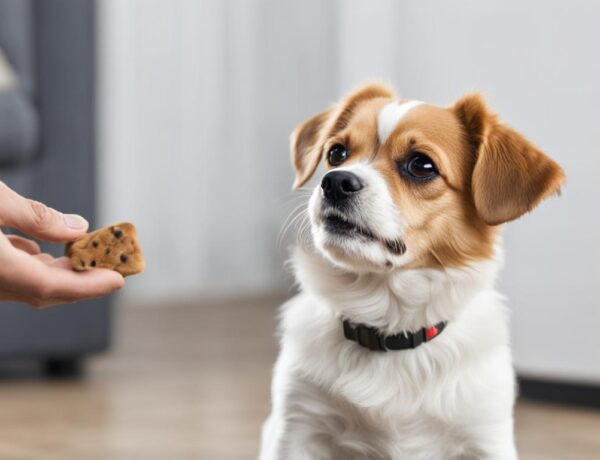As a pet owner, it’s crucial to understand that stress can affect small pets just as it affects humans. Just like us, they can experience a range of emotions and undergo stress-inducing situations. It’s our responsibility to recognize and address these stressors to ensure our furry friends lead happy and healthy lives.
Recognizing stress in pets involves understanding the behavioral signs that indicate their discomfort. Small pets often communicate their stress through various subtle cues, which can manifest in digestive or feeding issues, aggression toward people or other animals, and excessive sleepiness or lethargy. By knowing what to look for, we can take appropriate action to alleviate their stress.
When small pets are stressed, it is typically due to factors such as loud sounds, new people, changes in routine, or moving to a new home. The hormone cortisol, responsible for the stress response, plays an important role in the body. However, prolonged elevated levels can lead to chronic stress, negatively impacting our pets’ well-being.
To address stress in pets, there are several strategies that can be highly effective. Regular exercise is an excellent way to manage stress, as it helps release endorphins and promotes overall calmness. Establishing a routine provides a sense of security and predictability, which can significantly reduce anxiety. Additionally, using a compression wrap can provide gentle pressure that has been shown to have a calming effect on pets.
Key Takeaways:
- Stress can affect small pets, just like it affects humans.
- Behavioral signs of stress in pets include digestive or feeding issues, aggression toward people or other animals, and excessive sleepiness or lethargy.
- Regular exercise, establishing a routine, and using a compression wrap can help reduce stress and anxiety in small pets.
- Avoiding stress-inducing factors and providing a calm environment are essential for the well-being of small pets.
- Consulting with a veterinarian is crucial if you notice signs of stress in your pet to rule out any underlying health issues.
Signs of Stress in Small Pets: Digestive or Feeding Issues
One of the key signs of stress in small pets is digestive or feeding issues. If you notice that your pet is experiencing looser stools, diarrhea, lack of appetite, or vomiting, it could be a clear indication that something is wrong and they are experiencing stress.
These issues may occur despite being otherwise healthy, so it’s important to pay attention to any changes in their eating and digestion habits. These signs should be addressed promptly to ensure your pet’s well-being and to minimize further stress.
Stress can have a direct impact on your pet’s digestive system, causing disruptions and discomfort. The digestive system is sensitive to stress, and when the body is in a heightened state of stress, it can lead to gastrointestinal issues.
Stress hormones can affect the production of digestive enzymes and disrupt the normal functioning of the digestive system. This can result in diarrhea, constipation, or changes in appetite. Your pet may experience difficulty in digesting food properly, leading to malnutrition or weight loss.
Furthermore, stress can also affect the overall feeding habits of your pet. They may exhibit a lack of appetite, refuse to eat their regular meals, or show signs of being disinterested in food. Some pets may even vomit or regurgitate their food due to stress.
It’s important to monitor your pet’s eating and digestion habits closely and seek veterinary advice if you notice any persistent issues. Your veterinarian can help determine if stress is the underlying cause and provide guidance on managing and alleviating stress-related digestive problems.
Preventing and Managing Digestive Issues:
- Establish a consistent feeding routine: A regular feeding schedule can help reduce stress and provide a sense of stability for your pet. Stick to specific meal times and avoid abrupt changes to their feeding schedule.
- Provide a calm and quiet feeding environment: Minimize distractions and create a peaceful atmosphere during mealtimes. Find a quiet spot where your pet feels safe and comfortable.
- Consider stress-reducing techniques: Incorporate calming activities, such as gentle massages or puzzle toys, into your pet’s routine to help them relax and relieve stress.
- Introduce a balanced and appropriate diet: Provide your pet with a nutritionally balanced diet that meets their specific needs. Consult with your veterinarian to ensure you are feeding them the right food for their age, breed, and health condition.
- Keep your pet hydrated: Make sure your pet has access to fresh, clean water at all times to prevent dehydration and aid in proper digestion.
Addressing and managing stress is crucial to prevent and mitigate the impact on your pet’s digestive system. By identifying the signs of stress and taking proactive measures to address them, you can help promote a healthier and happier life for your small pet.
Signs of Stress in Small Pets: Aggression toward People or Other Animals
Another common sign of stress in small pets is aggression toward people or other animals. Pets may display aggressive behavior when they are feeling anxious or stressed, and this behavior is often out of character for them. If your pet is suddenly displaying aggression that is not typical of their usual behavior, it may be a clear indication that they are experiencing stress.
Addressing this aggression is crucial to helping your pet alleviate their stress and anxiety. Here are some strategies you can implement:
- Identify triggers: Observe your pet’s behavior and try to identify the specific situations or stimuli that trigger their aggression. This could include interactions with certain people, other animals, or environmental factors.
- Provide a safe environment: Create a calm and secure space for your pet where they can retreat to when they feel stressed or overwhelmed. This could be a designated room or an area with their favorite bed or toys.
- Positive reinforcement: Reward your pet for calm and non-aggressive behavior with treats, praise, or toys. This will help reinforce positive behaviors and redirect their focus away from aggression.
- Consult a professional: If your pet’s aggression persists or worsens, it may be beneficial to seek the guidance of a professional animal behaviorist or veterinarian. They can provide tailored advice and techniques to address your pet’s specific needs.
Remember, aggression in small pets is often a result of stress, and it’s crucial to address the underlying cause rather than punish your pet for their behavior. With patience, understanding, and the right approach, you can help your pet overcome their stress-related aggression and foster a harmonious environment for both your pet and your family.
Here is a visual representation of the strategies mentioned above:
| Strategies to Address Pet Aggression | |
|---|---|
| Identify triggers | Observe your pet’s behavior and identify the specific situations or stimuli that trigger their aggression. |
| Provide a safe environment | Create a calm and secure space for your pet where they can retreat to when they feel stressed or overwhelmed. |
| Positive reinforcement | Reward your pet for calm and non-aggressive behavior with treats, praise, or toys. |
| Consult a professional | If aggression persists or worsens, seek the guidance of a professional behaviorist or veterinarian. |
In addition to implementing these strategies, it’s important to pay attention to your pet’s overall well-being and provide them with a nurturing and stress-free environment. By addressing stress-related aggression, you can help your small pet lead a happier and more balanced life.
Signs of Stress in Small Pets: Excessive Sleepiness or Lethargy
Excessive sleepiness or lethargy can be indicative of stress in small pets. If you notice your pet sleeping more than usual or exhibiting a lack of energy, it may be a sign that they are experiencing stress. However, it’s important to consider that sleepiness and lethargy can also be symptoms of other conditions. To ensure your pet’s well-being, it is recommended to consult with a veterinarian to rule out any underlying health issues.
Addressing your pet’s stress is crucial for their overall well-being. By providing them with the necessary support and reducing their stress levels, you can help alleviate their sleepiness or lethargy. Keep in mind that each pet is unique, and what works for one may not work for another. It may be helpful to establish a consistent routine that includes regular exercise and mental stimulation to help reduce stress.
“Understanding your pet’s behavior and recognizing signs of stress is essential for their health and happiness. Excessive sleepiness or lethargy can be a clear indicator that something is affecting your pet’s well-being.” -Dr. Sarah Anderson
Creating a calm and stress-free environment is key to helping your small pet thrive. Consider incorporating interactive toys, providing a designated safe space, and engaging in activities that promote relaxation. Additionally, using calming techniques such as compression wraps or herbal remedies, under the guidance of a veterinarian, can help alleviate stress and promote a sense of well-being.
Common Causes of Excessive Sleepiness or Lethargy in Pets
While stress can be a significant factor contributing to sleepiness or lethargy in small pets, it’s essential to be aware of other potential causes for these symptoms. Some common causes include:
- Underlying medical conditions
- Lack of exercise or mental stimulation
- Changes in environment or routine
- Poor diet or nutrition
- Inadequate sleep or rest
If you notice any changes in your pet’s behavior or excessive sleepiness that lasts for an extended period, it’s crucial to seek veterinary advice. A thorough examination and appropriate diagnostics can help identify the underlying cause and guide the appropriate treatment plan.
By addressing your small pet’s stress and providing them with the necessary care and support, you can help improve their overall well-being and promote a sense of vitality and happiness in their daily lives.
Conclusion
Recognizing and addressing stress in small pets is crucial for their well-being. As pet owners, it’s important for us to understand the behavioral signs of stress that our furry friends may exhibit. Whether it’s digestive or feeding issues, aggression toward people or other animals, or excessive sleepiness or lethargy, recognizing these signs is the first step in helping our pets lead happier and healthier lives.
Addressing stress in small pets requires proactive steps on our part. One effective strategy is to provide pets with regular exercise. Engaging them in physical activities not only helps them burn off excess energy but can also reduce stress and anxiety. Another important aspect is establishing a routine. Pets thrive on predictability, so having a consistent schedule for feeding, playtime, and rest can help alleviate stress.
Additionally, using tools like compression wraps can be beneficial in reducing stress and anxiety. These wraps provide a gentle and comforting pressure that can help calm nervous pets. Ultimately, by addressing stress in small pets, we can create a positive and calm environment for our beloved companions.
FAQ
What are the behavioral signs of stress in small pets?
The behavioral signs of stress in small pets include digestive or feeding issues, aggression toward people or other animals, and excessive sleepiness or lethargy.
How can I recognize stress in my small pet?
You can recognize stress in your small pet by observing their behavior for signs such as digestive or feeding issues, aggression toward people or other animals, and excessive sleepiness or lethargy.
How can I address stress in my small pet?
To address stress in your small pet, you can provide regular exercise, establish a routine, and consider using tools like compression wraps to reduce stress and anxiety.
What are some common signs of stress in small pets related to digestive or feeding issues?
Common signs of stress in small pets related to digestive or feeding issues include looser stools, diarrhea, lack of appetite, or vomiting.
How can I help my small pet if they are showing aggression toward people or other animals due to stress?
If your small pet is showing aggression toward people or other animals due to stress, it’s important to address the aggression and provide them with the necessary support and strategies to alleviate their stress and anxiety.
What should I do if my small pet is excessively sleepy or lethargic, which could be a sign of stress?
If your small pet is excessively sleepy or lethargic, which could be a sign of stress, it’s best to consult with a vet to rule out any underlying health issues. Addressing your pet’s stress and providing them with the necessary support can help improve their overall well-being.
How important is it to recognize and address stress in small pets?
Recognizing and addressing stress in small pets is crucial for their well-being. By understanding the behavioral signs of stress and taking proactive steps to reduce it, pet owners can help their furry friends lead happier and healthier lives.
What are some tips for reducing stress and anxiety in small pets?
Some tips for reducing stress and anxiety in small pets include providing regular exercise, establishing a routine, and using tools like compression wraps.







No Comments